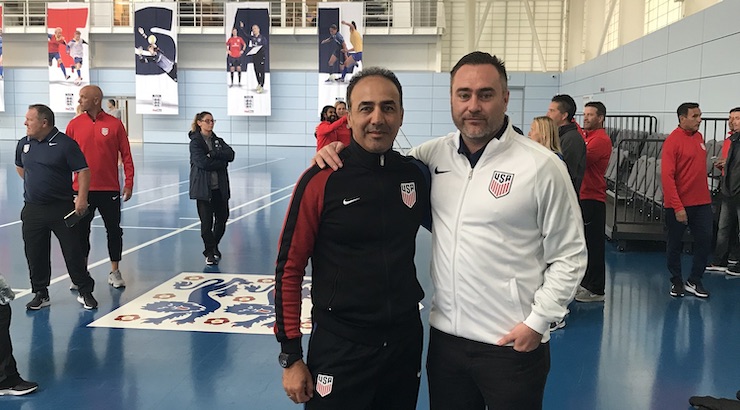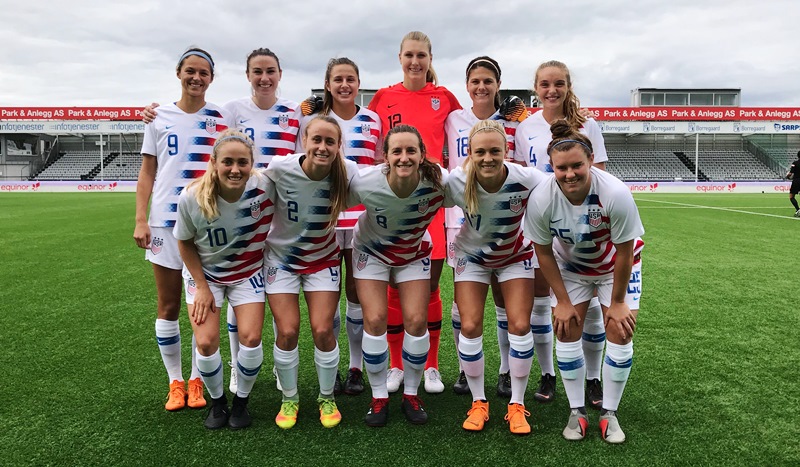What Can A Top Coach Learn on the U.S. Soccer’s Director Course in England? Education Reigns Supreme
Barry Ritson has recently returned from the U.S. Soccer Academy Directors Course in England and traveled with Platini Soaf among other top coaches in the USA. Ritson has earned a long list of accomplishments and honors which include the WPSL Hall of Fame Inductee 2015, USWNT U23 and 2001 Network Scout, LA Premier FC US Soccer Development Academy Director, 2017 ODP National Champion (Boys 2001, CalSouth). Ritson is also one of the founders of the Development Player League (DPL) expanding the opportunity for Girls outside the DA.
 Barry Ritson is LA Premier’s Executive Director of Coaching and holds a USSF ‘A’ License Coach as well as a United Soccer Coaches (NSCAA) Master Coach and Advanced DOC Certificate. A well respected and recognized force in youth soccer, Ritson competed professionally as a player across the Atlantic for Sunderland AFC and Burnley FC.
Barry Ritson is LA Premier’s Executive Director of Coaching and holds a USSF ‘A’ License Coach as well as a United Soccer Coaches (NSCAA) Master Coach and Advanced DOC Certificate. A well respected and recognized force in youth soccer, Ritson competed professionally as a player across the Atlantic for Sunderland AFC and Burnley FC.
In this interview, Ritson speaks out on a broad variety of topics including the highly charged emotionally charged coach parent releationship that can be improved with education and that fact, as far as developing the women’s side of the game, we are on the right track.
SoccerToday’s Interview with Barry Ritson
Diane Scavuzzo: You recently returned from London, England on a trip with U.S. Soccer Development Academy Directors’ course — what was it like?
Barry Ritson: The U.S. Soccer Development Academy Director course is a journey, it’s a year-long course. It’s a long, deliberate process to provoke thought and to generate an environment of sharing so that we can all improve.
The Directors Course focuses on improving the game, and the player’s experience.
In America, we need to focus on creating a culture that is growing the game and lets kids enjoy playing soccer.
Diane Scavuzzo: How do we create a strong soccer culture in America?
Barry Ritson: It comes down to education. Education and leadership. It is important to educate leaders at the club level and the coaches at the clubs across America.
The coaches across America are leaders of their teams. They need this education.
It is necessary to educate all these coaches so they are fully in line with the standards set by Federation and State organizations.
Related Soccer News: PLATINI SOAF “LET YOUNG KIDS JUST PLAY – STOP THE INSANE PRESSURE TO WIN”
To successfully create the soccer culture all across the country, it needs to be driven by the federation but also with the help of the entire membership including US Youth Soccer, US Club Soccer, United Soccer Coaches and everyone in the game.

Diane Scavuzzo: How has the U.S. Soccer promoted player development?
Barry Ritson: I believe that the standards implemented at the U.S. Soccer Development Academy (DA) have had a very positive impact on player development.
Because youth sports is a business and it is so easy to generate revenue, I think steps have to be made to have minimum standards.
Winning is a big part of American culture. Striving for greatness is intrinsic in this country’s DNA and we have to be conscious of the delicate balance between our drive to win and our desire to improve and focus on developing players.

Diane Scavuzzo: You have worked with soccer parents for many years, do you believe soccer parents understand this?
Barry Ritson: Soccer parents understand a lot and I think it’s dangerous to believe that parents are not educated in the game.
Parents are investing in their child’s future.
A lot of parents see youth soccer as an opportunity to provide their kid with a platform to succeed. Either on the field, through college scholarships — wherever the kid’s talent can take them or off the field, through the values learned in teams sports.
While soccer parents get a lot of things right, I think they get some crucial things wrong at highly emotional times. Emotions play a role in the toughest issues at the youth club level.
Diane Scavuzzo: Does winning soccer games on the weekends make a coach’s life easier?

Barry Ritson: It absolutely does. I think if you ask any coach … and, I say it all the time to my staff, winning smooths over the cracks.
For the example, when a coach has to miss a game, winning makes a big difference. If a team wins with a covering coach, you don’t get frustrated emails from parents. If a team loses with a coach who is covering the team, well, that is another story.
It all comes back to education because if you put that single game into perspective, in the context of a 10-month cycle, one game then does not seem to be all that significant.
Playing time is another emotional issue for many parents.
As a director of a club, you must be clear in your communication. For example, you can say, ‘During the summer, everybody plays — it’s about kids enjoying the game and creating a team chemistry — creating a platform for a season. During the league season, playing time is a reflection of your kid’s training performance.’
Personally, I believe every kid should experience playing in each half of the game. I think players need to experience the start of the game and experience the end of the match.
All the psychological aspects which go into teaching youths — it is important players have the opportunity to start a game and end a game. It is also important for players to experience starting the second half.
Otherwise, you are not truly developing the individual.
Diane Scavuzzo: What do you think our young American female player looks like?
Barry Ritson: This has changed over the years. Our American female players have a combination of strength, speed, power and some of our younger players are technically on par with any of the players in the world.
I watched 05 and 04 girls training summit at SilverLakes in California recently and I was blown away by their technical abilities. These players take initiative on the field, they move into areas ahead of the ball, they understand their roles within a system, and this is a great step forward and a testament to the education from their coaches, clubs and U.S. Soccer.
Diane Scavuzzo: In America, our women have a rich history of winning. As the World Cup Champions, are we doing enough to protect our future and develop the female soccer stars of tomorrow?
Barry Ritson: Yes, I believe we are on the right track and we are the leaders in the women’s game at the senior level.

I was fortunate to be part of our U23 US Women’s National Team staff at the Nordic Cup in August where we competed against England, Norway, and Sweden. The U.S. U23 defeated host Norway, 1-0, in the final game and earned first place at the four-team competition. And, after interacting with coaches from other countries, it was great to see the USA is still the benchmark.
I am optimistic that we are on the right track developing the stars of tomorrow.
Diane Scavuzzo: So, if you are giving advice to a young player, what would you tell them to focus on, if they had aspirations of trying to make a National team?
Barry Ritson: I would tell them simply to live with the ball.
Players should take every moment possible to interact with the ball.
It is important for players to be in love with the ball, and to be touching the ball on a daily basis. And, players need to find the right environment.
If a player is going to training and not competing in with their teammates, then there is an issue. Players need to be stretched and challenged in games — if the games are too easy or are too difficult, this is an issue which will impact a player’s development. I think players can plateau when they play on the best teams which win all the time — if they are not getting stretched in the competition. I believe it is important for players to face adversity and be in a game environment that’s challenging.
 Diane Scavuzzo: Is there too much pressure placed on youth soccer players?
Diane Scavuzzo: Is there too much pressure placed on youth soccer players?
Barry Ritson: I think there are unreasonable expectations placed upon many young players — by parents and coaches — that they have to be great all the time and when they are not great, there are repercussions.
It’s okay to be average now and again as long as there are some special moments.
Diane Scavuzzo: What is wrong with the youth soccer system right now?
Barry Ritson: We are fractured at the most crucial piece of player development — our youth national team levels where youth national team coaches are in a tug of war between what is politically correct within US soccer and what is best for the game of soccer.
Diane Scavuzzo: How do you think that ‘we’ are going to get past the politics?
Barry Ritson: I truly believe that the leadership of US soccer is going to find a way.
I believe U.S. Soccer can achieve this in one of two ways. They can do it through the by-laws and with a heavy-handed approach, or they can sit everybody at around the table — time and time again and chip away to create this change.
READ: PLATINI SOAF ON AMERICAN YOUTH SOCCER – WHAT’S RIGHT & WHAT’S WRONG
For more information on coaching courses, visit the U.S. Soccer’s Digital Coaching Center (DCC)





